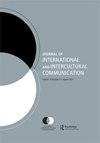#Oncegay stories: Exploring social conversion through the Changed Movement
IF 2.2
Q2 COMMUNICATION
Journal of International and Intercultural Communication
Pub Date : 2022-02-10
DOI:10.1080/17513057.2022.2033814
引用次数: 2
Abstract
ABSTRACT This paper employs a queer intercultural communication framework to analyze the Changed Movement’s website, an evangelical Christian group which claims individuals can change their sexual and gender identities through faith and testimony. I argue that the Changed Movement is a rhetorical site which makes possible a social conversion—one does not need to see a therapist to begin conversion. Changed naturalizes the white cisheterosexual evangelical subject on sociocultural and legal levels in the US nation-state to produce sexualized others that threaten to take the evangelical subject’s place, while employing Pulse shooting survivor testimony to, albeit ambiguously, support that “changed is possible.” Finally, I argue that queer intercultural scholarship must examine evangelical groups like Changed, which construct queer and trans people as subjects to be expelled from the sociocultural and national bodies. These cultural sites are inherently implicated into deeper intersections of power and oppression like whiteness and cisheterosexism.#曾经的故事:通过改变运动探索社会转变
本文采用酷儿跨文化交流的框架来分析“改变运动”的网站,这是一个福音派基督教团体,声称个人可以通过信仰和见证来改变自己的性和性别身份。我认为“改变运动”是一个使社会转变成为可能的修辞场所——一个人不需要去看治疗师就能开始转变。《改变》在美国民族国家的社会文化和法律层面上将白人异性恋福音派主体自然化,以产生性化的其他人,威胁着福音派主体的地位,同时利用Pulse枪击案幸存者的证词,尽管含糊不清,支持“改变是可能的”。最后,我认为酷儿跨文化研究必须审视像change这样的福音派团体,它们将酷儿和变性人视为被社会文化和国家机构驱逐的主体。这些文化遗址本质上与权力和压迫的更深层次的交叉点有关,比如白人和异性恋。
本文章由计算机程序翻译,如有差异,请以英文原文为准。
求助全文
约1分钟内获得全文
求助全文
来源期刊

Journal of International and Intercultural Communication
COMMUNICATION-
CiteScore
3.80
自引率
12.50%
发文量
19
 求助内容:
求助内容: 应助结果提醒方式:
应助结果提醒方式:


